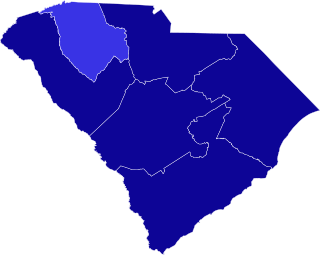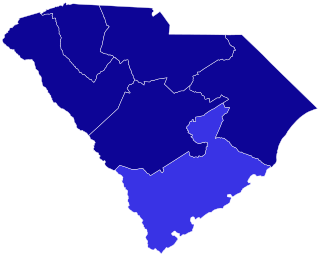
The 1956 United States House of Representatives elections in South Carolina were held on November 6, 1956, to select six Representatives for two-year terms from the state of South Carolina. All five incumbents who ran were re-elected and the open seat in the 5th congressional district was retained by the Democrats. The composition of the state delegation thus remained solely Democratic.

The 1962 United States House of Representatives elections in South Carolina were held on November 6, 1962 to select six Representatives for two-year terms from the state of South Carolina. The primary elections were held on June 12 and the runoff elections were held two weeks later on June 26. All five incumbents who ran were re-elected and the open seat in the 2nd congressional district was retained by the Democrats. The composition of the state delegation thus remained solely Democratic.

The 1944 United States House of Representatives elections in South Carolina were held on November 7, 1944, to select six Representatives for two-year terms from the state of South Carolina. All five incumbents who ran were re-elected and the open seat in the 2nd congressional district was retained by the Democrats. The composition of the state delegation thus remained solely Democratic.

The 1948 United States House of Representatives elections in South Carolina were held on November 2, 1948 to select six Representatives for two-year terms from the state of South Carolina. Four incumbents were re-elected, but John J. Riley of the 2nd congressional district was defeated in the Democratic primary by Hugo S. Sims, Jr. The seat remained with the Democrats along with the open seat in the 3rd congressional district and the composition of the state delegation remained solely Democratic.

The 1934 United States House of Representatives elections in South Carolina were held on November 6, 1934 to select six Representatives for two-year terms from the state of South Carolina. All six incumbents were re-elected and the composition of the state delegation remained solely Democratic.

The 1936 United States House of Representatives elections in South Carolina were held on November 2, 1936, to select six Representatives for two-year terms from the state of South Carolina. All five incumbents who ran were re-elected and the open seat in the 4th congressional district was retained by the Democrats. The composition of the state delegation thus remained solely Democratic.

The 1904 United States House of Representatives elections in South Carolina were held on November 8, 1904 to elect seven representatives Representatives for one two-year terms from the state of South Carolina. All five incumbents who ran were re-elected and the open seats in the 2nd congressional district and 6th congressional district were retained by the Democrats. The composition of the state delegation thus remained solely Democratic.

The 1908 United States House of Representatives elections in South Carolina were held on November 3, 1908, to select seven Representatives for two-year terms from the state of South Carolina. All seven incumbents were re-elected and the composition of the state delegation remained solely Democratic.

The 1916 United States House of Representatives elections in South Carolina were held on November 7, 1916 to select seven Representatives for two-year terms from the state of South Carolina. The primary elections were held on August 29 and the runoff elections were held two weeks later on September 12. Six incumbents were re-elected, but Wyatt Aiken of the 3rd congressional district was defeated in the Democratic primary. The seat was retained by the Democrats and the composition of the state delegation remained solely Democratic.

The 1920 United States House of Representatives elections in South Carolina were held on November 2, 1920, to select seven Representatives for two-year terms from the state of South Carolina. Four incumbents were re-elected and all three open seats were retained by the Democrats. The composition of the state delegation thus remained solely Democratic.

The 1922 United States House of Representatives elections in South Carolina were held on November 7, 1922, to select seven Representatives for two-year terms from the state of South Carolina. Six incumbents were re-elected and the open seat in the 6th congressional district was retained by the Democrats. The composition of the state delegation thus remained solely Democratic.

The 1932 United States House of Representatives elections in South Carolina were held on November 8, 1932, to select six representatives for two-year terms from the state of South Carolina. The state lost a seat from redistricting that occurred from the 1930 census. Four incumbents were re-elected and the two open seats were retained by the Democrats. The composition of the state delegation thus remained solely Democratic.

The 1888 United States House of Representatives elections in South Carolina were held on November 6, 1888, to select seven Representatives for two-year terms from the state of South Carolina. All seven incumbents were initially reported as re-elected and the composition of the state delegation remained solely Democratic, however Thomas E. Miller successfully contested the result in the 7th congressional district, claiming voter suppression of black Republican votes.

The 1890 United States House of Representatives elections in South Carolina were held on November 4, 1890 to select seven Representatives for two-year terms from the state of South Carolina. Two Democratic incumbents were re-elected, one Republican incumbent was defeated, and the four open seats were retained by the Democrats. The composition of the state delegation after the election was solely Democratic.

The 1892 United States House of Representatives elections in South Carolina were held on November 8, 1892, to select seven Representatives for two-year terms from the state of South Carolina. Two Democratic incumbents were re-elected, four open seats were won by the Democrats and the open seat in the 7th congressional district was picked up by the Republicans. The composition of the state delegation after the election was six Democrats and one Republican.

The 1896 United States House of Representatives elections in South Carolina were held on November 3, 1896, to select seven Representatives for two-year terms from the state of South Carolina. Five Democratic incumbents were re-elected, one Republican incumbent was defeated, and the open seat was retained by the Democrats. The composition of the state delegation after the election was solely Democratic.

The 1898 United States House of Representatives elections in South Carolina were held on November 8, 1898 to select seven Representatives for two-year terms from the state of South Carolina. Six Democratic incumbents were re-elected and the open seat was retained by the Democrats. The composition of the state delegation after the election was solely Democratic.

The 1902 United States House of Representatives elections in South Carolina were held on November 4, 1902 to select seven Representatives for two-year terms from the state of South Carolina. Four incumbents were re-elected and the three open seats were retained by the Democrats. The composition of the state delegation after the election was solely Democratic.

The 1906 United States House of Representatives elections in South Carolina were held on November 6, 1906, to select seven Representatives for two-year terms from the state of South Carolina. All seven incumbents were re-elected and the composition of the state delegation remained solely Democratic.




